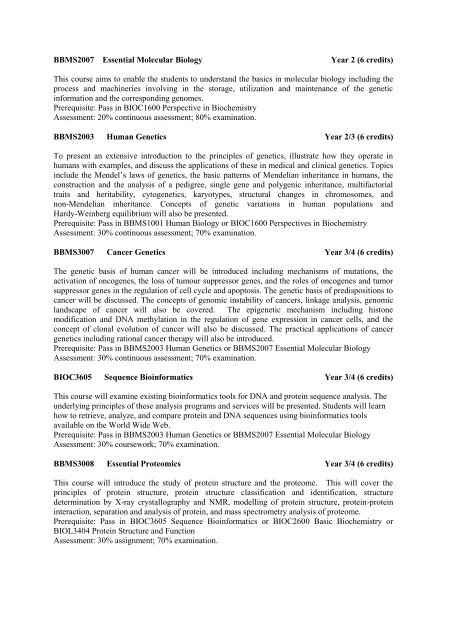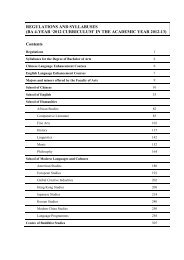Bachelor of Biomedical Sciences (BBiomedSc) - The University of ...
Bachelor of Biomedical Sciences (BBiomedSc) - The University of ...
Bachelor of Biomedical Sciences (BBiomedSc) - The University of ...
Create successful ePaper yourself
Turn your PDF publications into a flip-book with our unique Google optimized e-Paper software.
BBMS2007 Essential Molecular Biology Year 2 (6 credits)This course aims to enable the students to understand the basics in molecular biology including theprocess and machineries involving in the storage, utilization and maintenance <strong>of</strong> the geneticinformation and the corresponding genomes.Prerequisite: Pass in BIOC1600 Perspective in BiochemistryAssessment: 20% continuous assessment; 80% examination.BBMS2003 Human Genetics Year 2/3 (6 credits)To present an extensive introduction to the principles <strong>of</strong> genetics, illustrate how they operate inhumans with examples, and discuss the applications <strong>of</strong> these in medical and clinical genetics. Topicsinclude the Mendel’s laws <strong>of</strong> genetics, the basic patterns <strong>of</strong> Mendelian inheritance in humans, theconstruction and the analysis <strong>of</strong> a pedigree, single gene and polygenic inheritance, multifactorialtraits and heritability, cytogenetics, karyotypes, structural changes in chromosomes, andnon-Mendelian inheritance. Concepts <strong>of</strong> genetic variations in human populations andHardy-Weinberg equilibrium will also be presented.Prerequisite: Pass in BBMS1001 Human Biology or BIOC1600 Perspectives in BiochemistryAssessment: 30% continuous assessment; 70% examination.BBMS3007 Cancer Genetics Year 3/4 (6 credits)<strong>The</strong> genetic basis <strong>of</strong> human cancer will be introduced including mechanisms <strong>of</strong> mutations, theactivation <strong>of</strong> oncogenes, the loss <strong>of</strong> tumour suppressor genes, and the roles <strong>of</strong> oncogenes and tumorsuppressor genes in the regulation <strong>of</strong> cell cycle and apoptosis. <strong>The</strong> genetic basis <strong>of</strong> predispositions tocancer will be discussed. <strong>The</strong> concepts <strong>of</strong> genomic instability <strong>of</strong> cancers, linkage analysis, genomiclandscape <strong>of</strong> cancer will also be covered. <strong>The</strong> epigenetic mechanism including histonemodification and DNA methylation in the regulation <strong>of</strong> gene expression in cancer cells, and theconcept <strong>of</strong> clonal evolution <strong>of</strong> cancer will also be discussed. <strong>The</strong> practical applications <strong>of</strong> cancergenetics including rational cancer therapy will also be introduced.Prerequisite: Pass in BBMS2003 Human Genetics or BBMS2007 Essential Molecular BiologyAssessment: 30% continuous assessment; 70% examination.BIOC3605 Sequence Bioinformatics Year 3/4 (6 credits)This course will examine existing bioinformatics tools for DNA and protein sequence analysis. <strong>The</strong>underlying principles <strong>of</strong> these analysis programs and services will be presented. Students will learnhow to retrieve, analyze, and compare protein and DNA sequences using bioinformatics toolsavailable on the World Wide Web.Prerequisite: Pass in BBMS2003 Human Genetics or BBMS2007 Essential Molecular BiologyAssessment: 30% coursework; 70% examination.BBMS3008 Essential Proteomics Year 3/4 (6 credits)This course will introduce the study <strong>of</strong> protein structure and the proteome. This will cover theprinciples <strong>of</strong> protein structure, protein structure classification and identification, structuredetermination by X-ray crystallography and NMR, modelling <strong>of</strong> protein structure, protein-proteininteraction, separation and analysis <strong>of</strong> protein, and mass spectrometry analysis <strong>of</strong> proteome.Prerequisite: Pass in BIOC3605 Sequence Bioinformatics or BIOC2600 Basic Biochemistry orBIOL3404 Protein Structure and FunctionAssessment: 30% assignment; 70% examination.
















